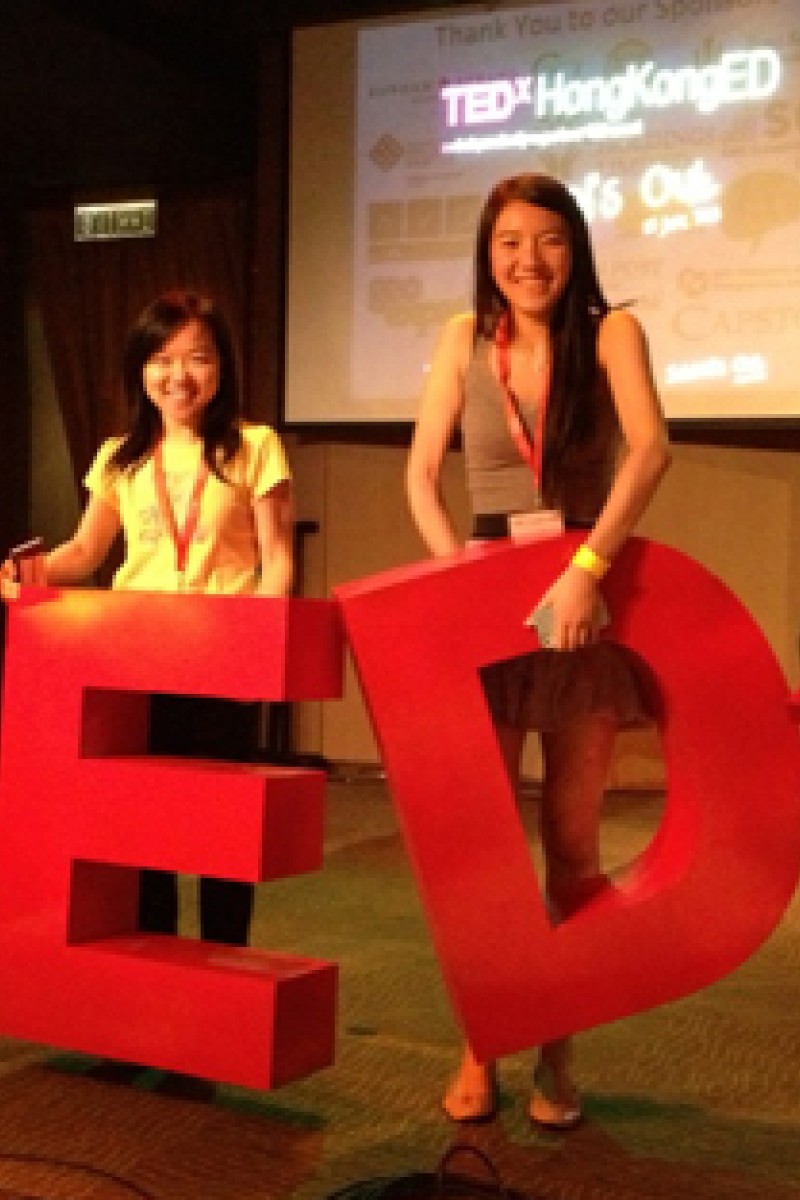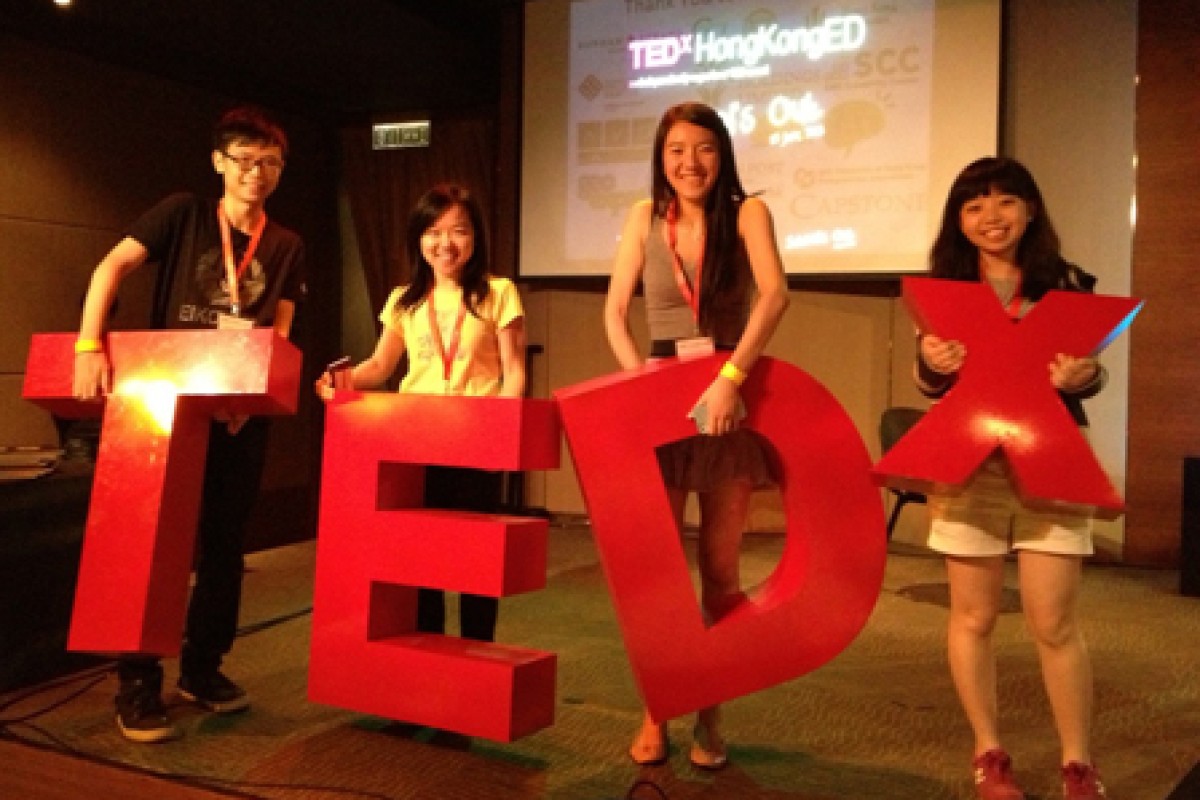
 Junior reporters (from left) Alex Wong, Gigi Wong Ying-chi, Leanne Lam, and Winnie Lee Wing-yee at the TEDx talk.
Junior reporters (from left) Alex Wong, Gigi Wong Ying-chi, Leanne Lam, and Winnie Lee Wing-yee at the TEDx talk.Douglas Kidd, education consultant
Although "inclusive education" exists in Hong Kong - in which students with special needs study in the same class with able-bodied students - some parents complain that the government does not provide adequate resources, which lowers the schools' quality. However, Kidd - special needs co-ordinator at Island Christian Academy and a consultant for Generations Christian Education - argues that the most important factor in inclusive education is sympathy and passion from teachers who truly believe that "the whole class has become better because they have students with special education needs". But if the special-needs students are isolated, how can they and the able-bodied students interact? Kidd says his daughter has never seen special-needs students, even though they are in the same classroom with her. He says nurturing interpersonal skills in special-needs students is much more important than grades.
Gigi Wong Ying-chi
Leanne Lam poses with one of the TEDx speakers, Mr. Douglas Kidd. Photo: Leanne Lam
Dr Jadis Blurton, The Harbour School
In the first talk, Blurton, the principal and director of The Harbour School, called for changes in the education system to keep up with the times. Information is now everywhere, and anyone can learn about anything on the internet with a simple click of a button. Some parents, she said, even doubt the necessity of schools, arguing that their children can learn using their HK$4,000 iPads instead of paying millions in transportation and tuition fees. Blurton also said the massive school workload and the pressures from their parents and society have resulted in an increase in the number of students with mental illness.
Lastly, Blurton emphasised the importance of arts and humanities. She said a person will benefit spiritually by learning about how everything started and how mankind came to where it is now. A quote from another speaker, Douglas Kidd, summarised Blurton's point. He said: "You cannot have an education without a concept of humanity and a philosophy of life."
Leanne Lam
Sophie Leung Lau Yau-fun, Young Entrepreneurs Development Council
Lau, the council's founding chairwoman, said Hong Kong's education system is too systematic. She said the reason she founded the Young Entrepreneurs Development Council was to provide moral support to youth whose creativity should be treasured and nurtured.
Alex Wong
Julian Zhu, Dialogue in the Dark Hong Kong
Holding a braille script, Zhu, the training director of Dialogue in the Dark Hong Kong, captivated the audience using only his powerful words and stories; he didn't rely on any facial expressions or gestures. Visually impaired after being born with an eye disorder, Zhu said: "The best way to learn is to encounter." Instead of merely listening to lectures about the disabled and the difficulties they face, Zhu recommended that the audience try experiencing the problems themselves, as they do at Dialogue in the Dark, a social enterprise. One of DiD's exhibitions helps sighted people understand how the visually impaired live by putting them in a darkened room and telling them to try to do normal activities, such as buying coffee.
Rob Lilwall, adventurer at large
"If not now, then when?" is Lilwall's motto. An adventurer from a young age, he is a prime example of the saying: "He who travels far knows much." As someone who cycled 50,000 kilometres from Siberia to Hong Kong through 28 countries, he tells teenagers to pursue their dreams while their burdens are light, which is now.
Winnie Lee Wing-yee
Peter Kenny, Renaissance College
TEDx ended on a high note with a humorous talk by Kenny, the college's founding principal. After analysing the local education system by saying its conformity kills creativity, he said some of the best teaching environments are outside the classroom, such as exchanges with businesses, which "brings more reality back into our schools". He also said the two-tiered system of private schools for the rich and government schools for the poor keeps students born to less affluent parents away from a quality education.
Alex Wong
Ideas Empowered was the theme of TEDxWanChai's third year of organising speakers and spreading ideas, which took place on July 14 at Shouson Theatre in Wan Chai. Our junior reporters went to check it out
Fermi Wong, Unison
"Humans, no matter what colours they are, have the same dignity," was the message of this founder. A migrant from the mainland, Wong found that Hong Kong was not an easy place to live, especially for ethnic minorities. This inspired her to set up Unison in 2001 after being provided with a free office and equipment donated by charities. She was determined to stamp out racial discrimination and to fight for education - a basic human right of the ethnic minorities.
Wong's next goal is to ensure that ethnic minority students receive a quality education.
Winnie Lee Wing-yee
Wu Xian-yi, d.Light
In developing countries, where there's a desperate need for electricity, people rely heavily on kerosene lamps. But the lamps cause respiratory diseases and accidental fires. Wu, d.Light's co-founder, says his faith in God and respect for his fellow-men motivated him to come up with the innovative idea of creating solar lamps. The plan is to charge them during the day and use them at night. As a result, people were able to study and read at night, so education levels improved. Today, many have brighter futures and a way out of poverty. But it's only a start: Wu aims to distribute 100 million solar lamps by the end of 2020.
Amanda Ho
Speaker Wu Xian-yi of d.Light.
Lisa Christensen, EcoVision
Christensen, founder of the eco-education NGO, delivered a thought-provoking talk on her journey through life, and how determination is the key to reaching your goals. Her own road to success has had its ups and downs. During the Sars epidemic in 2003, she reached a low point in her life. Her organisation was not running well, her engagement was called off, and her father was diagnosed with cancer. She says when everything seemed to be crashing down on her all at once, the only way to achieve what she has always wanted out of life was to stop leaning on others and simply rely on herself.
Henry Lui
Sean Lee-Davis, Project C: Change
Lee-Davies talked about his new initiative, Project C: Change. It is about converting biofuel - which is obtained from living matter - to usable fuel. He set out to transport from Singapore to Cambodia a machine which can convert vegetable oil, after it has been used for cooking, into fuel. He said it's an idea that could change the entire fuel industry. Agricultural waste in countries such as Cambodia can also be converted into these fuels. The best part is that these fuels can work in a regular car engine, which could provide a quick, effective, long-term solution to our energy crisis.
Sonali Gidwani
Sean Lee-Davis of Project C: Change.
Michelle Kim, Hong Kong Generation Next Arts
Kim, the founder of Hong Kong Generation Next Arts, said she faced numerous insecurities and personal issues while growing up. However, when Kim performed at a Christmas concert at a church in Honduras, she was touched hearing the children sing along joyfully in their angelic voices. The experience inspired her to set up HKGNA years later to share her passion for music and empower street kids in Hong Kong.
Kim said she used to strive for perfection in music, but learned its ability to touch people is what's most important. "Everyone has a gift," Kim says. "I tell the kids: 'I hope you find it, share it, and get in touch with others with your gift.'"
Giselle Chan
Michelle Kim of Hong Kong Generation Next Arts.
You might also like:
- Our junior reporters learned how to reduce carbon emissions by cooking low-carbon-footprint food.